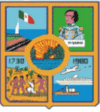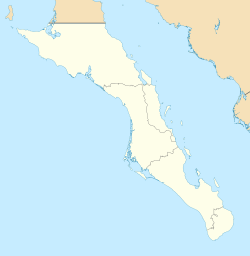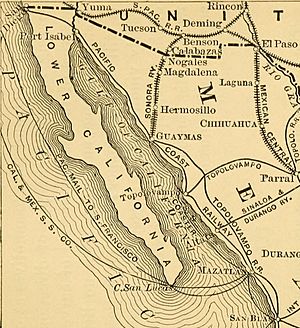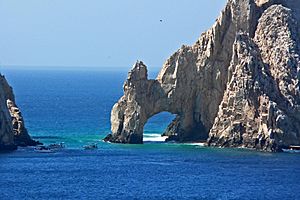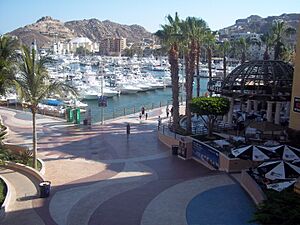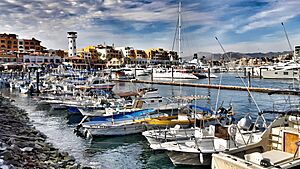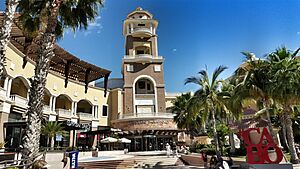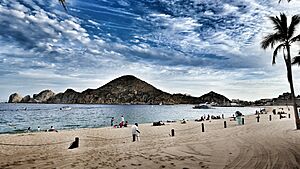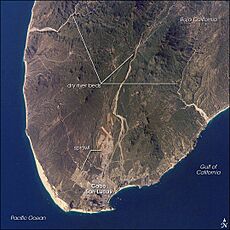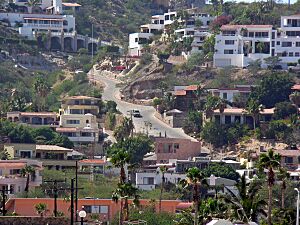Cabo San Lucas facts for kids
Quick facts for kids
Cabo San Lucas
Yenecamú
|
||
|---|---|---|
|
City
|
||
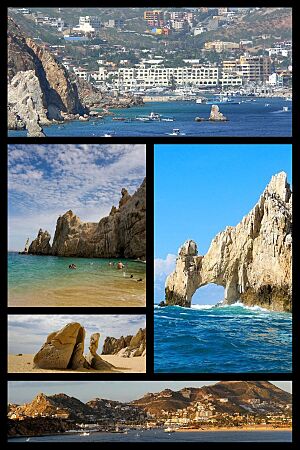
Above, from left to right: Cabo San Lucas Bay, rock formation, Arcos de Cabo San Lucas, Beach and Panoramic.
|
||
|
||
| Nickname(s):
Cabo
|
||
| Country | Mexico | |
| State | Baja California Sur | |
| Municipality | Los Cabos | |
| Area | ||
| • City | 48.11 km2 (18.58 sq mi) | |
| Elevation | 10 m (30 ft) | |
| Population
(2020 Census)
|
||
| • City | 202,694 | |
| • Density | 4,213.1/km2 (10,912.0/sq mi) | |
| • Metro | 351,111 | |
| Demonym(s) | Cabeño | |
| Time zone | UTC−7 (Pacific (US Mountain)) | |
| • Summer (DST) | UTC−6 (Central Standard Time Zone) | |
| Area code(s) | 624 | |
Cabo San Lucas, often called Cabo, is a lively resort city in Mexico. It sits at the very southern tip of the Baja California peninsula. This city is part of the Mexican state of Baja California Sur.
As of 2020, about 202,694 people live in Cabo San Lucas. It is famous for its beautiful beaches and amazing places to go scuba diving. Many people also love to visit the natural rock arch called El Arco de Cabo San Lucas.
Cabo San Lucas and its nearby city, San José del Cabo, are together known as Los Cabos. This whole area is a very popular spot for tourists. You'll find many resorts and vacation homes along the coast between the two cities.
The waters around Cabo are full of interesting marine animals. You can spot rays, sharks, mahi-mahi (also called dorado), and striped marlin here.
Contents
Discovering Cabo's Past
People have lived in the Cabo San Lucas area for at least 10,000 years. When the first Europeans arrived, they met the Pericú people. These early inhabitants found food by hunting and gathering seeds, roots, shellfish, and other things from the sea. They called this special place Yenecamú.
A Japanese sailor named Hatsutaro visited Cabo San Lucas in 1842. He wrote that there were only two houses and about 20 people living there. Later, an American writer, John Ross Browne, said an Englishman named Thomas "Old Tom" Ritchie founded the town around 1828. However, the true founder of Cabo San Lucas was Cipriano Ceseña in 1788. He came from Hermosillo, Sonora.
Over time, a small fishing village grew in the area. In 1917, an American company built a platform to catch tuna. Ten years later, they started a company called Compañía de Productos Marinos S.A. This plant helped the fishing industry for many years.
Fun Things to Do in Cabo
Cabo San Lucas is a top spot for vacations and spas. There are many interesting places to see. You can find lots of resorts and vacation homes built along the coast. These are located between Cabo San Lucas and San José del Cabo. The famous Arch of Cabo San Lucas is a well-known landmark at the very end of the land.
Cabo San Lucas hosts the world's biggest marlin tournament. It's called the Bisbee's Los Cabos Offshore. This exciting event happens every October.
In the winter, you can often see groups of whales in the waters. They travel thousands of kilometers from Alaska and Siberia. They come to the warm waters of the Gulf of California to have their babies.
How Tourism Grew
Cabo San Lucas has beautiful beaches, great surfing, and amazing sport fishing. These things have brought many people, both from Mexico and other countries, to vacation here. The Mexican government helped Cabo's tourism grow a lot starting in 1974. They built new roads and other important things.
After the main highway, Mexican Federal Highway 1, was finished, tourism in Los Cabos grew very quickly. Many resorts and hotels were built.
Today, many resorts in Los Cabos are trying to be more eco-friendly. They are working to save water and reduce trash. This helps protect the unique environment of Baja.
Getting Around Cabo
Cabo San Lucas and San José del Cabo share an airport called Los Cabos International Airport. In 2022, over 3.3 million visitors arrived at this airport. This shows how popular the area has become.
The town is also a popular stop for many cruise ships. Cabo San Lucas has a small international airfield. This airfield is used for private planes and air taxi services.
Many tourists use local taxis to get around the main parts of Cabo. Buses are another option and are less expensive. They are mostly used by locals but are also available for tourists. You can also use Uber in the Los Cabos area.
Nightlife and Fun Activities
Cabo has many fun places to visit at night. One famous club is the Cabo Wabo Cantina. This nightclub is owned by rock singer Sammy Hagar. It was named after a hit song by his band, Van Halen. You can also find the Baja Brewing Company here.
The local English newspaper, the Gringo Gazette, shares news about tourist activities. It covers Cabo San Lucas, San Jose, Todos Santos, La Paz, and the East Cape Baja.
Resort Areas to Explore
Chileno Bay is one of the most visited beaches in the area. It is home to many tropical fish, sea turtles, and other sea creatures. People often go snorkeling here to see the amazing underwater life.
Cabo's Weather
The very south of the Baja California has a tropical desert climate. This means it's usually hot and dry. Even with temperature changes, it never freezes here.
In summer, Cabo San Lucas is a bit cooler than San José del Cabo. Sometimes, when winds come from the Pacific Ocean, the temperature differences are even bigger.
Cabo San Lucas gets less rain than San José del Cabo. However, hurricanes can bring very heavy rain for long periods. Hurricane Odile hit Cabo San Lucas in September 2014. It caused a lot of damage. Local summer thunderstorms usually don't bring rain to the town because of its location.
The sea temperature is coolest in winter, around 21-22°C (70-72°F). It gets warmest in summer, reaching about 28-29°C (82-84°F).
| Climate data for Cabo San Lucas, 1951–2010 normals, extremes 1937–2010 | |||||||||||||
|---|---|---|---|---|---|---|---|---|---|---|---|---|---|
| Month | Jan | Feb | Mar | Apr | May | Jun | Jul | Aug | Sep | Oct | Nov | Dec | Year |
| Record high °C (°F) | 36.0 (96.8) |
37.0 (98.6) |
37.0 (98.6) |
41.0 (105.8) |
40.0 (104.0) |
41.5 (106.7) |
41.0 (105.8) |
44.0 (111.2) |
44.0 (111.2) |
41.0 (105.8) |
38.0 (100.4) |
37.0 (98.6) |
44.0 (111.2) |
| Mean daily maximum °C (°F) | 25.4 (77.7) |
25.9 (78.6) |
26.9 (80.4) |
29.0 (84.2) |
30.7 (87.3) |
31.7 (89.1) |
33.3 (91.9) |
33.7 (92.7) |
33.0 (91.4) |
32.1 (89.8) |
29.4 (84.9) |
26.8 (80.2) |
29.8 (85.6) |
| Daily mean °C (°F) | 19.2 (66.6) |
19.3 (66.7) |
20.2 (68.4) |
22.2 (72.0) |
23.8 (74.8) |
25.3 (77.5) |
28.1 (82.6) |
29.0 (84.2) |
28.4 (83.1) |
26.7 (80.1) |
23.5 (74.3) |
20.6 (69.1) |
23.9 (75.0) |
| Mean daily minimum °C (°F) | 13.0 (55.4) |
12.7 (54.9) |
13.5 (56.3) |
15.4 (59.7) |
17.0 (62.6) |
19.0 (66.2) |
22.8 (73.0) |
24.2 (75.6) |
23.9 (75.0) |
21.4 (70.5) |
17.5 (63.5) |
14.5 (58.1) |
17.9 (64.2) |
| Record low °C (°F) | 4.5 (40.1) |
1.5 (34.7) |
1.0 (33.8) |
7.0 (44.6) |
6.5 (43.7) |
10.0 (50.0) |
10.0 (50.0) |
10.0 (50.0) |
10.0 (50.0) |
10.0 (50.0) |
1.0 (33.8) |
5.0 (41.0) |
1.0 (33.8) |
| Average precipitation mm (inches) | 11.7 (0.46) |
3.4 (0.13) |
1.8 (0.07) |
1.3 (0.05) |
0.1 (0.00) |
0.0 (0.0) |
13.3 (0.52) |
48.5 (1.91) |
82.3 (3.24) |
32.2 (1.27) |
11.5 (0.45) |
14.5 (0.57) |
220.6 (8.69) |
| Average precipitation days (≥ 0.1 mm) | 1.2 | 0.4 | 0.3 | 0.1 | 0.1 | 0.0 | 1.1 | 2.9 | 3.3 | 1.6 | 0.7 | 1.0 | 12.7 |
| Source: Servicio Meteorologico Nacional | |||||||||||||
| Jan | Feb | Mar | Apr | May | Jun | Jul | Aug | Sep | Oct | Nov | Dec |
|---|---|---|---|---|---|---|---|---|---|---|---|
| 22.4 °C
72.4 °F |
21.5 °C
70.7 °F |
21.5 °C
70.6 °F |
21.5 °C
70.7 °F |
23.5 °C
74.3 °F |
23.1 °C
73.5 °F |
25.7 °C
78.2 °F |
28.5 °C
83.2 °F |
29.5 °C
85 °F |
29 °C
84.1 °F |
26.8 °C
80.2 °F |
24 °C
75.3 °F |
Who Lives in Cabo?
| Historical population | ||
|---|---|---|
| Year | Pop. | ±% |
| 1990 | 16,059 | — |
| 1995 | 28,483 | +77.4% |
| 2010 | 68,464 | +140.4% |
| 2015 | 81,111 | +18.5% |
In 2015, about 81,111 people lived in Cabo San Lucas. The city has grown very quickly. It is the third-largest city in Baja California Sur. La Paz and San José del Cabo are larger.
Many people who live in Cabo San Lucas are from the United States. Along with those in San José del Cabo, they make up 80% of the U.S. population in the state.
Learning in Cabo
Cabo San Lucas has several schools for different age groups.
Middle and High Schools
- Moises Saenz Garza is a public school in Downtown Los Cabos.
- Colegio Papalotl, also known as Liceo, offers multiple levels of education.
- Colegio Amaranto is a private school in Cabo San Lucas.
- Colegio El Camino is a private school in Pedregal. It is accredited for K-12 education.
- CETMAR N°31 is a public high school with ocean-related studies.
- Cobach N°04 is a public high school focused on technical education.
Universities
- The Instituto de Estudios Superiores de Los Cabos is a campus of the National Technological Institute of Mexico.
- UABCS Los Cabos is a branch campus of the public Universidad Autónoma de Baja California Sur.
See also
 In Spanish: Cabo San Lucas para niños
In Spanish: Cabo San Lucas para niños
 | William M. Jackson |
 | Juan E. Gilbert |
 | Neil deGrasse Tyson |


